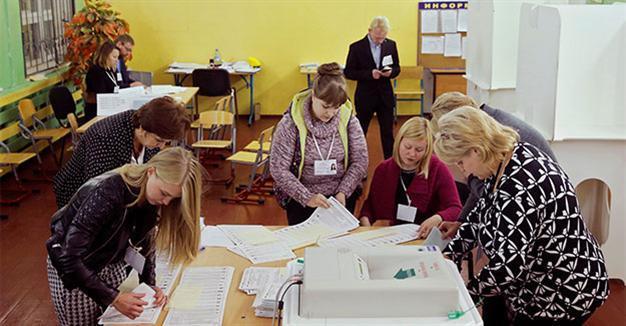Putin’s party scores crushing win in Russia parliament vote
MOSCOW – Agence France-Presse

Members of a local election commission count unused ballots at a polling station following a parliamentary election in Moscow, Russia, September 18, 2016. REUTERS photo
Russia’s ruling United Russia party has cruised to an easy victory in parliamentary polls that could pave the way for President Vladimir Putin to glide to a fourth term in 2018 elections, with more than 93 percent of votes counted.The Sept. 18’s ballot for the 450-seat State Duma was smooth sailing for authorities desperate to avoid a repeat of mass protests last time round and eager to increase their dominance as Russia faces the longest economic crisis of Putin’s rule.
But a low turnout of less than 50 percent suggested that many Russians may have been turned off by a system in which the Kremlin wields near-total power, which could raise questions over legitimacy.
“We can announce already with certainty that the party secured a good result, that it won,” Putin said after polls closed.
“The situation is tough and difficult but the people still voted for United Russia,” he said on state television.
With more than 93 percent of the votes counted, the United Russia party had 54.3 percent of votes, securing it at least 343 seats in the 450-member parliament, up from 238 previously, and a constitutional majority, according to results announced on the morning of Sept. 19.
It was followed by the Communists and the ultranationalist Liberal Democratic Party, on 13.5 percent and 13.2 percent respectively, and A Just Russia, which received 6.2 percent, results published by the central election commission showed.
Those four parties - which made up the last parliament and all back the Kremlin - were the only ones to clear the five percent threshold needed to claim a share of the one-half of seats up for grabs.
The vote comes as Putin’s approval ratings remain high at around 80 percent and authorities appear to be banking on trouble-free presidential elections in two years.
Results indicated that liberal opposition groups would not make it into parliament, with neither the Yabloko party, nor the Parnas party of former Prime Minister Mikhail Kasyanov and assassinated Putin critic Boris Nemtsov, having secured enough votes to win a seat.
“I’m upset by such a low turnout at these polls. Russians are letting go possibly the last chance to change the authorities democratically,” Kasyanov said after the vote ended.
With only a fraction of the votes counted, Russian Prime Minister Dmitry Medvedev confidently said that his party would end up with an “absolute majority” in the Duma.
Though the overall tally for United Russia was higher than the 49 percent it claimed in 2011, participation was low, particularly in Moscow and Saint Petersburg.
Only 47.8 of voters cast their ballots, against 60 percent in 2011, electoral officials said.
The Sept. 18 election follows a tumultuous few years that have seen Russia seize the Crimea peninsula from Ukraine, plunge into its worst standoff with the West since the Cold War and start a military campaign in Syria.
But the Kremlin exerts almost complete control over the media and public discourse, and this year’s election campaign was dubbed the dullest in recent memory.
Looming large was the specter of mass protests over vote rigging that followed the last legislative polls five years ago and grew into the biggest challenge to Putin since he took charge in 2000.
Since then the Kremlin has cracked down on the right to protest while making a show of stamping out electoral manipulation.
The former scandal-tainted election chief was removed in favor of a human rights advocate who allowed more genuine opposition candidates to take part.
















